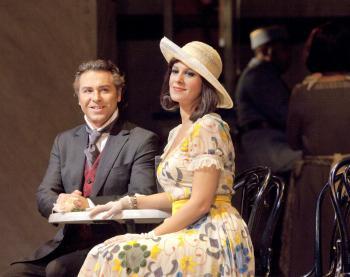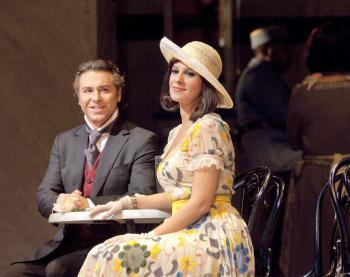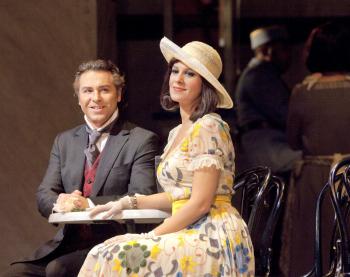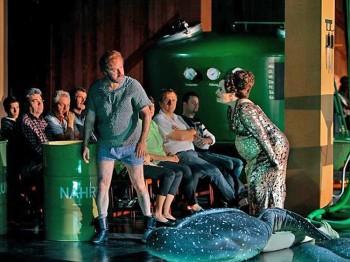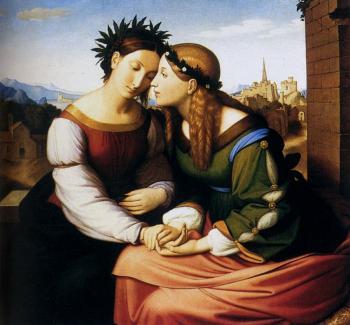NEW YORK—Nobody dies and at the end the characters simply return to their previous lives—can this be a Puccini opera? It is: This story of a woman who escapes from her golden cage to search for true love doesn’t need tragedy and pathos. It is in the lightness of this neglected masterpiece, “La Rondine“ (“The Swallow”) wherein its grace lies.
The Met’s New Year’s Eve production of “La Rondine” can thank its passionate singers and its summer-like stage design for helping us forget the gray winter days and overlook, yes, some similarities to “Die Fledermaus,”—like a maid who borrows her lady’s gown to go to a party where guests disguise their true identities and flirt.
Thanks to Roberto Alagna and Angela Gheorghiu, “La Rondine” made a comeback on European stages in the ‘90s. It has been 75 years since it appeared at the Met. Fresh and romantic as can be, director Nicolas Joël sets the story in the ‘20s, featuring fabulous costumes by Franca Squarciapino and a gorgeous art deco setting, reminescent of Klimt, designed by Ezio Frigerio. This staging was co-produced by Theatre du Capitole, Toulouse and the Royal Opera House, Covent Garden, London.
Moreover, this “Swallow” flies on an April breeze due to the sensitive hands of conductor Marco Armiliato, who brings out the refinement and femininity of the score: Lush melodies paired with parallel chords and atmospheric ambient sounds—sweet and elegant, but never kitschy.
Puccini wrote “La Rondine” after his greatest operas had already made him world famous. It was originally commissioned as an operetta for a Viennese theater and never recovered from that association; it has rarely been taken seriously as an opera. It premiered in Monte Carlo in 1917, as World War I had made its premiere in Vienna impossible.
The Met’s New Year’s Eve production of “La Rondine” can thank its passionate singers and its summer-like stage design for helping us forget the gray winter days and overlook, yes, some similarities to “Die Fledermaus,”—like a maid who borrows her lady’s gown to go to a party where guests disguise their true identities and flirt.
Thanks to Roberto Alagna and Angela Gheorghiu, “La Rondine” made a comeback on European stages in the ‘90s. It has been 75 years since it appeared at the Met. Fresh and romantic as can be, director Nicolas Joël sets the story in the ‘20s, featuring fabulous costumes by Franca Squarciapino and a gorgeous art deco setting, reminescent of Klimt, designed by Ezio Frigerio. This staging was co-produced by Theatre du Capitole, Toulouse and the Royal Opera House, Covent Garden, London.
Moreover, this “Swallow” flies on an April breeze due to the sensitive hands of conductor Marco Armiliato, who brings out the refinement and femininity of the score: Lush melodies paired with parallel chords and atmospheric ambient sounds—sweet and elegant, but never kitschy.
Puccini wrote “La Rondine” after his greatest operas had already made him world famous. It was originally commissioned as an operetta for a Viennese theater and never recovered from that association; it has rarely been taken seriously as an opera. It premiered in Monte Carlo in 1917, as World War I had made its premiere in Vienna impossible.
The Story
Magda lives a luxurious life as the mistress of Rambaldo, a wealthy old gentleman. A glamour girl in her salon, she is adored by the ironic poet Prunier and envied by her giggling, glittery friends.
One scene is enough to characterize Rambaldo: He presents to Magda a precious pearl necklace, saying:” I wanted to give it to you before dinner, darling, but I forgot about it…” Samuel Ramey delivers a short, yet impressive entrance. That the baritone legend’s voice is growing old only helps the fatherly and self-controlled part of Rambaldo.
